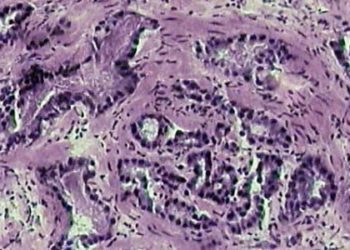Post-operative radiotherapy showed limited long-term protection against breast cancer local recurrence
Image: PD
1. Post-operative radiation therapy is associated with significantly reduced risk for local recurrence of breast cancer in the first 5 years after primary treatment.
2. Data suggests that radiotherapy offers no additional protective effect after 5 years of follow-up.
Evidence rating level: 1 (Excellent)
Study Rundown: Post-operative radiotherapy after breast-conserving surgery for early breast cancer has been demonstrated to reduce the risk for cancer recurrence. However, as many women treated for early stage breast cancer ultimately become long-term survivors, the long-term protective and toxic effects of this therapy are of interest. Previous trials with long-term follow-up have analyzed the results of lumpectomy and quadrantectomy and concluded that post-operative radiotherapy was associated with reduced recurrence. The purpose of this study was to report the 20-year findings from the Uppsala/Orebro study, which examined women treated by standardized sector resection with or without adjuvant radiotherapy.
At the conclusion of this study, the authors found that radiotherapy protects against breast cancer recurrences during the first five years of follow-up, but that this effect does not extend past that point. Furthermore, there was no significant difference in breast cancer death, cardiovascular death or overall mortality between the two treatment groups. Based on these results, the authors suggest that radiotherapy exerts its protective effects by eradicating undetected cancer foci present at the time of primary treatment, and that cancer-related events more than 5 years following treatment may represent de novo tumors. Though this study was insufficiently powered to identify subgroups within this population that would experience more or less benefit with radiotherapy, doing so would allow further refinement in the use of this treatment.
These results benefit from the population-based, randomized and controlled design. Furthermore, long-term follow-up was minimized in both treatment groups. Nevertheless, the limited sample size left this study underpowered to investigate any potential effects of post-operative radiotherapy on different subgroups. Therefore, further study is needed to evaluate the long-term effects of radiotherapy.
Click to read the article in JCO
Relevant reading: 10-year results after sector resection with or without postoperative radiotherapy for stage I breast cancer: a randomized trial
In-Depth [randomized controlled trial]: A total of 514 patients with T1N0 disease were initially recruited, and 381 ultimately enrolled after excluding patients with multiple tumors in pathologic report and undefinable tumor size on mammography. These women were then randomly assigned to breast conserving surgery by sector resection with post-operative radiation therapy or to sector resection alone. Both groups were then followed for more than 20 years through December 2010. Complete follow-up was achieved for nearly all patients in both arms and analysis was by intention to treat. The primary outcomes were time to first breast cancer event (defined as local recurrence distant/reginao metastases or death due to generalized breast cancer). Secondary outcomes included time to first event of contralateral breast cancer, death from other cancers, time to death due to generalized breast cancer and time to all-cause mortality.
At 20 year follow-up, the absolute risk difference between the two treatment arms was 14% (95% CI, -24% to -5%), which was almost exclusively attributable to the difference in local recurrence as a first event. The total risk of first breast cancer event of any type after 20 years was 30.9% in the radiotherapy group and 45.1% in the surgery group (HR 0.58, 95% CI, 0.41 to 0.82). Overall mortality was 50.4% and 54% (HR, 0.92, 95% CI 0.71 to 1.19), respectively. Contralateral cancer and death due to non-breast cancer were 27.1% and 24.9% (HR, 1.17, 95% CI 0.77 to 1.77), respectively.
More from this author: Rituximab linked with reduced chronic immune disease following stem cell transplantation, High-dose prophylaxis for hemophilia increases costs with minimal benefit, Ambrisentan found ineffective against idiopathic pulmonary fibrosis
© 2013 2minutemedicine.com. All rights reserved. No works may be reproduced without expressed written consent from 2minutemedicine.com. Disclaimer: We present factual information directly from peer reviewed medical journals. No post should be construed as medical advice and is not intended as such by the authors, editors, staff or by 2minutemedicine.com. PLEASE SEE A HEALTHCARE PROVIDER IN YOUR AREA IF YOU SEEK MEDICAL ADVICE OF ANY SORT.






